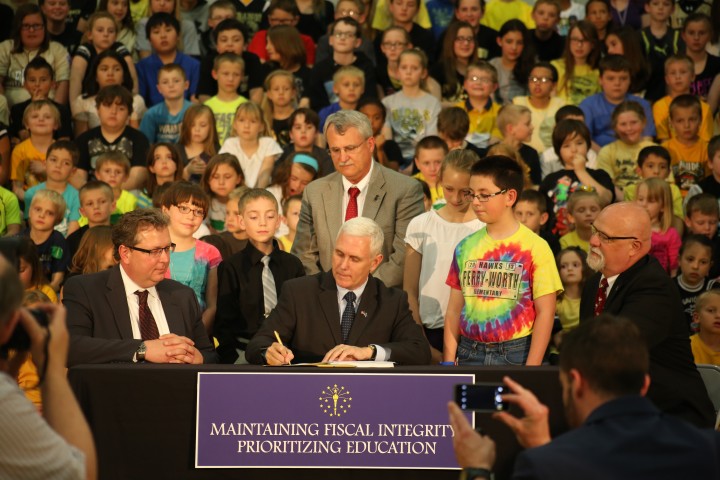Indiana Gov. Mike Pence visited a Boone County elementary school May 7 to sign the biennial budget bill for fiscal years 2016-2017, which has a focus on education. Students at Perry Worth Elementary School in Lebanon looked on as the governor signed the legislation.
“The 2015 legislative session of the Indiana General Assembly was an education session, and the biennial budget I signed into law today speaks volumes of its success,” Pence said in a statement. “Over the course of the next two years, Indiana’s future looks bright with a budget that is honestly balanced, holds the line on spending, reduces state debt, and maintains our reserves, all while making historic investments in education, innovation, and reform.”
Over the biennium, the bill:
·Includes more than $480 million in new money for K-12 funding, as well as a new funding formula;
·Allocates $70 million in teacher performance grants;
·Invests $20 million to continue Indiana’s first pre-K pilot program started last year;
·Designates more than $66 million for adult high schools to provide Hoosiers who may have dropped out of high school with a second chance to earn a diploma; and
·Reduces the funding disparity between charter and traditional public schools by providing charter schools for the first time ever with facility and transportation funding of $500 per pupil.
The bill also appropriates funds to reduce infant mortality and allocates $5 million in new funding for domestic violence prevention and treatment.
In anticipation of Indiana’s bicentennial in 2016, the budget bill provides $50 million in funding for the state’s bicentennial celebration, including a new state archives building and a new inn at Potato Creek State Park. All of the costs for the bicentennial are offset by funding from a lease of underutilized state cell tower capacity and will be of no cost to taxpayers.

